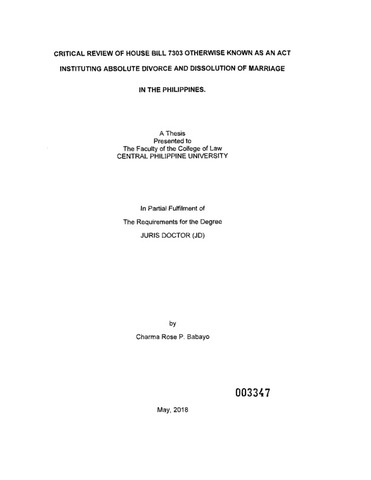Critical review of House Bill 7303 otherwise known as an Act Instituting Absolute Divorce and Dissolution of Marriage in the Philippines
| dc.contributor.adviser | Alibogha, Salex E. | |
| dc.contributor.author | Babayo, Charma Rose P. | |
| dc.coverage.spatial | Philippines | en_US |
| dc.date.accessioned | 2021-06-21T08:19:55Z | |
| dc.date.available | 2021-06-21T08:19:55Z | |
| dc.date.issued | 2018 | |
| dc.identifier.citation | Babayo, C. R. P. (2018). Critical review of House Bill 7303 otherwise known as an Act Instituting Absolute Divorce and Dissolution of Marriage in the Philippines (Unpublished postgraduate thesis). Central Philippine University, Jaro, Iloilo City. | en_US |
| dc.identifier.uri | https://hdl.handle.net/20.500.12852/1057 | |
| dc.description | Abstract only | en_US |
| dc.description.abstract | The Philippines is the only country in the world, aside from the Vatican, where divorce is not legal. Despite the lack of divorce law in the country and the high costs of obtaining an annulment, recent data shows that a growing number of Filipinos dissolve their marital unions, either legally or informally. The proposed law is definitely unconstitutional. It is expressly stated in Article 15 on The Family, Section 2 of the Charter: 'Marriage, as an inviolable social institution, is the foundation of the family and shall be protected by the State. The proposed law is definitely unconstitutional. It is expressly stated in Article 15 on The Family, Section 2 of the Charter: 'Marriage, as an inviolable social institution, is the foundation of the family and shall be protected by the State. House Bill 7303 aims to make divorce more accessible to a wider range of couples seeking liberty from irreparable marriage. It provides that the “State shall assure that the court proceedings for the grant of absolute divorce shall be affordable and inexpensive, particularly for court assisted litigants and petitioners.” The proposed measure also pushes for a pro-women legislation as the bill notes that in most cases of irreparable marriages it is the wife who is entitled to liberation from an abusive relationship. The status of the children of divorced couples also takes precedence. A joint petition for divorce should include a plan for parenthood that details support, parental authority, custody and living arrangements of the common children. For the legitimate and adopted children of divorced spouses, they will retain their legal status after the petition for divorce is granted. A child born or conceived within 300 days after filing for divorce is also considered a legitimate child, except when the basis for divorce is marital infidelity of the wife. The bill also proposes that divorced spouses shall have the right to remarry. One of the grounds under the proposed bill is when “one of the spouses undergoes a gender reassignment surgery.” Other grounds include: • reasons stated under legal separation and annulment under the Family Code • separation of spouses for at least five years • legal separation by judicial decree for at least two years • psychological incapacity • irreconcilable marital differences The bill also seeks to penalize a spouse found guilty of coercing his or her partner into marriage. The respondent will face imprisonment of five years and a fine of P200,000. This study entails in finding out the cases of marriage dissolution and divorce that has swollen over the years. Why is it there is a latency in the marriage law currently existed? Openly assailing the previous assumptions of the pluralist "the claim of critics that political process is not open to permit all issues". These issues, specifically, are potential issues that can be conveyed to the actors' attention. It is claimed also that issues or problems met do not even scratched the surface of government's assessment process because the demands for change are debarred from aeration of their complaints through the operation of bias favoring other groups, ideas, interests and a lot more. As mentioned by Schattschneider (1960), “Some issues are organized into politics while others are organized out”. Moreover, these issues can be disallowed from being aired and contributors or members can be prohibited completely in the participation. There are a lot of ways into which powerful actors such as the church for an example, have accomplished far over the mobilization of prejudice or bias. Sets of predominant values, beliefs of groups or person, rituals done and institutional procedures that operates methodically and dependably to benefit certain people and other groups or coalitions at the disbursement of the others. Those who benefited are being place in a more favorable spot to defend and to endorse what interests them the most. | en_US |
| dc.format.extent | viii, 63 leaves | en_US |
| dc.language.iso | en | en_US |
| dc.rights | Attribution-NonCommercial-NoDerivs 3.0 Philippines | * |
| dc.rights.uri | http://creativecommons.org/licenses/by-nc-nd/3.0/ph/ | * |
| dc.subject.ddc | Law Library 340.72 B112 | en_US |
| dc.subject.lcsh | Divorce | en_US |
| dc.subject.lcsh | Divorce--Law and legislation | en_US |
| dc.subject.lcsh | Marriage law | en_US |
| dc.subject.lcsh | Custody of children | en_US |
| dc.subject.lcsh | Philippines | en_US |
| dc.title | Critical review of House Bill 7303 otherwise known as an Act Instituting Absolute Divorce and Dissolution of Marriage in the Philippines | en_US |
| dc.type | Thesis | en_US |
| dc.description.bibliographicalreferences | Includes bibliographical references | en_US |
| dc.contributor.chair | Bedona, Zacarias D. Jr. | |
| dc.contributor.department | College of Law | en_US |
| dc.description.degree | Juris Doctor | en_US |
| local.subject | An Act Instituting Absolute Divorce and Dissolution of Marriage in the Philippines. | en_US |
| local.subject | HB 7303 | en_US |
Fichier(s) constituant ce document
Ce document figure dans la(les) collection(s) suivante(s)
-
Juris Doctor [144]



